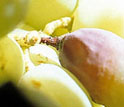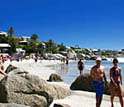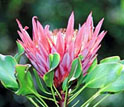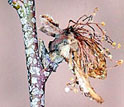Session Announcement:
Disease management
Keynote speakers: Maarten de Waard and
Philip Elmer
A wide range of strategies are available for control of diseases caused
by Botrytis spp. These include chemical applications, cultural
management, biological control and host resistance. Chemical control
is a major strategy in management of many Botrytis diseases.
In time, the arsenal of fungicides available is constantly subject to
changes. Therefore, the search for new and better fungicides proceeds
continuously. There are many publications reporting successful biological
control of Botrytis spp. in the laboratory and in controlled
environments but very few are commercialized. Where effective biological
controls are available, industry uptake has often been slow and we examine
some of the barriers to greater use by producers. Despite these challenges,
most recent research is very encouraging as scientists identify unique
combinations of biological controls and natural products that provide
Botrytis disease control equal to that of conventional fungicides.
This session will focus on new developments in chemical and biological
disease control.
Details of the speakers:
Dr Maarten de Waard
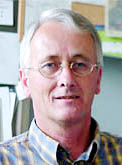 Wageningen
University, Laboratory of Phytopathology, Binnenhaven 5, 6709 PD, Wageningen,
The Netherlands Wageningen
University, Laboratory of Phytopathology, Binnenhaven 5, 6709 PD, Wageningen,
The Netherlands
Phone +31 317 483123, E-mail: maarten.dewaard@wur.nl
Biography:
1968: MSc Phytopathology, Wageningen University, The Netherlands
1968-1972: Junior scientist National Council for Research in Agriculture,
Wageningen
1972: Assistant professor, Laboratory of Phytopathology, Wageningen
University.
1974: PhD Fungicides
1975: Sabbatical year University of Maryland, USA
1977: Associate professor in Phytopharmacy.
Research topics include mode of action and selectivity of fungicides,
fungicide resistance, and molecular genetics of fungi with respect to
drug transporter genes in Aspergillus nidulans, Botrytis
cinerea, and Mycosphaerella graminicola.
For more details see: http://www.php.wur.nl/uk
Dr Philip Elmer
 The
Horticulture and Food Research Institute of New Zealand, Ruakura Research
Centre, Private Bag, 3123, Hamilton, New Zealand
Phone +64-7-8584783, E-mail: pelmer@hortresearch.co.nz
Biography:
1990: PhD Plant Pathology, Lincoln University, New Zealand (NZ)
1990-1992: Post-Doctoral Fellow: MAFTechnology, Lincoln, NZ
1992-1995: Scientist, HortResearch, Lincoln, NZ
1995-1996: Sabbatical year, IPO-DLO, Wageningen, The Netherlands and University
of California, Kearney Agricultural Centre, Parlier, USA
1997-2005: Scientist, Ruakura Research Centre, Hamilton, NZ
2006-present: Senior Scientist, BioProtection Group, Ruakura Research
Centre, Hamilton, NZ
Research topics include epidemiology, ecology and biological suppression
of Botrytis cinerea. The integration of biological control antagonists,
with activators of host defenses and natural products for Botrytis
and powdery mildew control in viticulture. Other research interests include;
biological suppression of Sclerotinia sclerotiorum in kiwifruit
as an alternative to iprodione and enhancing host defenses via fruit nutrition
in stonefruits and grapes.
The session focuses on chemical and biological control topics. The
Key note lecture on chemical control by Maarten de Waard will review fungal
drug transporters known to play an important role in sensitivity and resistance
to fungicides and on inhibitors of these drug transporters, described
in literature as modulators. Some modulators display disease control while
they are almost not fungitoxic in vitro. This may be ascribed to inhibition
of drug transporters that act as pathogenicity factors. Hence, modulators
may act as leads in the discovery of new disease control products.
The second keynote lecture will be presented by Philip Elmer. In the first
part of this lecture, the biological suppression of Botrytis bunch rot
in viticulture will be reviewed. The second part of the lecture will focus
on the research that has resulted in the commercialization of two new,
complimentary biological control products (BioGro certified) for grape
growers in New Zealand. As market pressures continue to increase for residue-free
wine, the evolution of a three component, biological control strategy
for season-long Botrytis control in New Zealand vineyards will be described.
Important
Symposium Dates
20 Aug: Deadline for Early Bird registration and accommodation
reservations at special Symposium rates.
7 Sept: Final day for registration and payment of presenting
authors. We do, however, urge authors to register and pay their registration
fee by 20 August in order to qualify for the early bird registration fee.
PLEASE NOTE that abstracts by presenting authors who have not
registered and paid by 7 September, will be removed from the official
programme and book of abstracts.
1 Oct: Final day for Secretariat to receive registrations.
21 - 26 Oct: 14th International Botrytis
Symposium.
Please
contact the Symposium Secretariat should you require any information or
assistance.
Tel + 27 21 886 4496 Fax +27 21 883 8177
Email: conf@conferencesetal.co.za
and deidre@iafrica.com
Conferences et al
P O Box 452
Stellenbosch
7599
Tel 27 21 886 4496
Fax 27 21 883 8177
Website: www.conferencesetal.co.za
For more information on the The XIV International Botrytis Symposium please
visit the website at
http://academic.sun.ac.za/botrytis2007
Main
sponsor: Bayer CropScience
Sponsors:
BASF, DFPT Research, Inqaba Biotech, Sigma-Aldrich, Separation Scientific,
Cape Biotech, Philagro, ABSA, Winetech, SAWWV,
NRF
Exhibitors:
Bayer CropScience, Inqaba Biotech, BASF, Separation Scientific, Pocket
Diagnostics, FieldClimate
|


 The
Horticulture and Food Research Institute of New Zealand, Ruakura Research
Centre, Private Bag, 3123, Hamilton, New Zealand
The
Horticulture and Food Research Institute of New Zealand, Ruakura Research
Centre, Private Bag, 3123, Hamilton, New Zealand